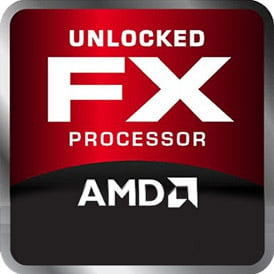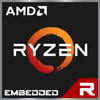
AMD FX-6300 Benchmark, Test and specs
Last updated:
The AMD FX-6300 is a 6 core processor. It can handle 6 threads simultaneously and was introduced in Q4/2012. The AMD FX-6300 is based on the 2. generation of the AMD FX series and requires a mainboard with the socket AM3+. The AMD FX-6300 scores 529 points with one CPU core in the Geekbench 5 benchmark. When using all CPU cores, the result is 1,916 points.

| Name: | AMD FX-6300 |
|---|---|
| Family: | AMD FX (30) |
| CPU group: | AMD FX-6300 (2) |
| Architecture: | Vishera (Bulldozer) |
| Segment: | Desktop / Server |
| Generation: | 2 |
| Predecessor: | -- |
| Successor: | -- |
CPU Cores and Base Frequency
The 6 CPU cores of the AMD FX-6300 clock with 3.50 GHz (4.10 GHz). The number of CPU cores and the clock frequency of the processor are largely responsible for the overall performance.
| CPU Cores / Threads: | 6 / 6 |
|---|---|
| Core architecture: | normal |
| Cores: | 6x |
| Hyperthreading / SMT: | No |
|---|---|
| Overclocking: | Yes |
| Frequency: | 3.50 GHz |
| Turbo Frequency (1 Core): | 4.10 GHz |
| Turbo Frequency (6 Cores): | 4.10 GHz |
Memory & PCIeThe AMD FX-6300 supports up to 32 GB memory in up to 2 (Dual Channel) memory channels. This results in a maximum memory bandwidth of 29.9 GB/s. |
|
| Memory type: | Memory bandwidth: |
|---|---|
| DDR3-1866 | 29.9 GB/s |
| Max. Memory: | 32 GB |
| Memory channels: | 2 (Dual Channel) |
| ECC: | No |
| PCIe: | 3.0 |
| PCIe Bandwidth: | -- |
Thermal ManagementWith the TDP, the processor manufacturer specifies the cooling solution required for the processor. The AMD FX-6300 has a TDP of 95 W. |
|
|---|---|
| TDP (PL1 / PBP): | 95 W |
| TDP (PL2): | -- |
| TDP up: | -- |
| TDP down: | -- |
| Tjunction max.: | 71 °C |
Technical details
The AMD FX-6300 has a 8.00 MB large cache. The processor is manufactured in 32 nm. Modern production increases the efficiency of the processor.
| Technology: | 32 nm |
|---|---|
| Chip design: | |
| Socket: | AM3+ |
| L2-Cache: | -- |
| L3-Cache: | 8.00 MB |
| AES-NI: | Yes |
| Operating systems: | Windows 10, Linux |
| Virtualization: | AMD-V |
|---|---|
| Instruction set (ISA): | x86-64 (64 bit) |
| ISA extensions: | SSE4.1, SSE4.2, AVX, FMA3, FMA4 |
| Release date: | Q4/2012 |
| Release price: | 95 $ |
| Part Number: | -- |
| Documents: | -- |
Rate this processor
Benchmark results

The benchmark results for the AMD FX-6300 have been carefully checked by us. We only publish benchmark results that have been created by us or that have been submitted by a visitor and then checked by a team member. All results are based on and fullfill our benchmark guidelines.
Geekbench 5, 64bit (Single-Core)
Geekbench 5 is a cross plattform benchmark that heavily uses the systems memory. A fast memory will push the result a lot. The single-core test only uses one CPU core, the amount of cores or hyperthreading ability doesn't count.

|
AMD A10-6700
4C 4T @ 4.30 GHz |
||

|
Intel Core i5-3317U
2C 4T @ 2.60 GHz |
||

|
Intel Pentium 3560M
2C 2T @ 2.40 GHz |
||
|
|
AMD FX-6300
6C 6T @ 4.10 GHz |
||

|
Intel Xeon E5450
4C 4T @ 3.00 GHz |
||

|
AMD 3015e
2C 4T @ 2.30 GHz |
||

|
MediaTek Helio G96
8C 8T @ 2.05 GHz |
||
Geekbench 5, 64bit (Multi-Core)
Geekbench 5 is a cross plattform benchmark that heavily uses the systems memory. A fast memory will push the result a lot. The multi-core test involves all CPU cores and taks a big advantage of hyperthreading.

|
Qualcomm Snapdragon 695 5G
8C 8T @ 2.20 GHz |
||

|
Qualcomm Snapdragon 750G
8C 8T @ 2.20 GHz |
||

|
Intel Core i7-7600U
2C 4T @ 3.90 GHz |
||
|
|
AMD FX-6300
6C 6T @ 4.10 GHz |
||

|
Samsung Exynos 9810
8C 8T @ 2.90 GHz |
||

|
Intel Core i7-6567U
2C 4T @ 3.00 GHz |
||
|
|
HiSilicon Kirin 810
8C 8T @ 2.20 GHz |
||
Geekbench 6 (Single-Core)
Geekbench 6 is a benchmark for modern computers, notebooks and smartphones. What is new is an optimized utilization of newer CPU architectures, e.g. based on the big.LITTLE concept and combining CPU cores of different sizes. The single-core benchmark only evaluates the performance of the fastest CPU core, the number of CPU cores in a processor is irrelevant here.

|
Intel Core i5-3210M
2C 4T @ 3.10 GHz |
||

|
Intel Atom x6425E
4C 4T @ 3.00 GHz |
||

|
Intel Core i7-3537U
2C 4T @ 3.10 GHz |
||
|
|
AMD FX-6300
6C 6T @ 4.10 GHz |
||

|
Intel Core i3-2125
2C 4T @ 3.30 GHz |
||

|
Intel Core i3-2120
2C 4T @ 3.30 GHz |
||

|
AMD Opteron X3216
2C 2T @ 3.00 GHz |
||
Geekbench 6 (Multi-Core)
Geekbench 6 is a benchmark for modern computers, notebooks and smartphones. What is new is an optimized utilization of newer CPU architectures, e.g. based on the big.LITTLE concept and combining CPU cores of different sizes. The multi-core benchmark evaluates the performance of all of the processor's CPU cores. Virtual thread improvements such as AMD SMT or Intel's Hyper-Threading have a positive impact on the benchmark result.

|
Intel Core i5-2400S
4C 4T @ 2.50 GHz |
||

|
AMD Ryzen 3 3200U
2C 4T @ 2.60 GHz |
||

|
AMD Ryzen 3 3250U
2C 4T @ 2.60 GHz |
||
|
|
AMD FX-6300
6C 6T @ 4.10 GHz |
||

|
Intel Core i3-5157U
2C 4T @ 2.50 GHz |
||

|
Intel Core i5-2300
4C 4T @ 2.80 GHz |
||

|
Qualcomm Snapdragon 730
8C 8T @ 2.20 GHz |
||
Cinebench R20 (Single-Core)
Cinebench R20 is the successor of Cinebench R15 and is also based on the Cinema 4 Suite. Cinema 4 is a worldwide used software to create 3D forms. The single-core test only uses one CPU core, the amount of cores or hyperthreading ability doesn't count.

|
Intel Celeron N4500
2C 2T @ 2.80 GHz |
||

|
Intel Pentium Silver J5005
4C 4T @ 2.80 GHz |
||

|
Intel Pentium Silver J5040
4C 4T @ 3.20 GHz |
||
|
|
AMD FX-6300
6C 6T @ 4.10 GHz |
||

|
AMD A9-9425
2C 2T @ 3.70 GHz |
||

|
AMD A8-5600K
4C 4T @ 3.90 GHz |
||

|
Intel Celeron J4125
4C 4T @ 2.70 GHz |
||
Cinebench R20 (Multi-Core)
Cinebench R20 is the successor of Cinebench R15 and is also based on the Cinema 4 Suite. Cinema 4 is a worldwide used software to create 3D forms. The multi-core test involves all CPU cores and taks a big advantage of hyperthreading.

|
AMD Athlon 3000G
2C 4T @ 3.50 GHz |
||

|
Intel Xeon X3440
4C 8T @ 2.53 GHz |
||

|
Intel Core i5-2400
4C 4T @ 3.10 GHz |
||
|
|
AMD FX-6300
6C 6T @ 4.10 GHz |
||

|
AMD Athlon 240GE
2C 4T @ 3.50 GHz |
||

|
Intel Pentium G4600
2C 4T @ 3.60 GHz |
||

|
AMD FX-6200
6C 6T @ 4.10 GHz |
||
Blender 3.1 Benchmark
In the Blender Benchmark 3.1, the scenes "monster", "junkshop" and "classroom" are rendered and the time required by the system is measured. In our benchmark we test the CPU and not the graphics card. Blender 3.1 was presented as a standalone version in March 2022.

|
Intel Core i5-7360U
2C 4T @ 3.60 GHz |
||

|
Intel Core i5-1035G1
4C 8T @ 3.20 GHz |
||

|
Intel Core i5-8265U
4C 8T @ 2.30 GHz |
||
|
|
AMD FX-6300
6C 6T @ 4.10 GHz |
||

|
Intel Core i3-10110U
2C 4T @ 3.20 GHz |
||

|
AMD Ryzen 3 3200U
2C 4T @ 2.60 GHz |
||

|
AMD Ryzen 3 5300U
4C 8T @ 3.60 GHz |
||
Estimated results for PassMark CPU Mark
Some of the CPUs listed below have been benchmarked by CPU-monkey. However the majority of CPUs have not been tested and the results have been estimated by a CPU-monkey’s secret proprietary formula. As such they do not accurately reflect the actual Passmark CPU mark values and are not endorsed by PassMark Software Pty Ltd.

|
AMD Phenom II X4 960T
4C 4T @ 3.40 GHz |
||

|
Intel Core i3-8140U
2C 4T @ 3.10 GHz |
||

|
AMD Ryzen Embedded V1500B
4C 8T @ 2.20 GHz |
||
|
|
AMD FX-6300
6C 6T @ 4.10 GHz |
||

|
AMD Ryzen Embedded R1606G
2C 4T @ 3.00 GHz |
||

|
Intel Core i5-2450P
4C 4T @ 3.20 GHz |
||

|
Intel Atom x6413E
4C 4T @ 2.40 GHz |
||
Blender 2.81 (bmw27)
Blender is a free 3D graphics software for rendering (creating) 3D bodies, which can also be textured and animated in the software. The Blender benchmark creates predefined scenes and measures the time (s) required for the entire scene. The shorter the time required, the better. We selected bmw27 as the benchmark scene.

|
Intel Core i5-7200U
2C 4T @ 3.10 GHz |
||

|
Intel Core i7-7500U
2C 4T @ 3.50 GHz |
||

|
AMD Phenom II X6 1055T
6C 6T @ 3.30 GHz |
||
|
|
AMD FX-6300
6C 6T @ 4.10 GHz |
||

|
Intel Core i3-7020U
2C 4T @ 2.30 GHz |
||

|
Intel Core i7-4600U
2C 4T @ 3.30 GHz |
||

|
Intel Core i5-5300U
2C 4T @ 2.70 GHz |
||
CPU-Z Benchmark 17 (Single-Core)
The CPU-Z benchmark measures a processor's performance by measuring the time it takes the system to complete all benchmark calculations. The faster the benchmark is completed, the higher the score.

|
Intel Core 2 Quad Q9400
4C 4T @ 2.66 GHz |
||

|
AMD FX-4300
4C 4T @ 3.80 GHz |
||

|
AMD FX-8320
8C 8T @ 3.75 GHz |
||
|
|
AMD FX-6300
6C 6T @ 4.10 GHz |
||

|
Intel Core i5-2410M
2C 4T @ 2.30 GHz |
||

|
Intel Core 2 Quad Q6600
4C 4T @ 2.40 GHz |
||

|
Intel Core i5-4210U
2C 4T @ 2.35 GHz |
||
CPU-Z Benchmark 17 (Multi-Core)
The CPU-Z benchmark measures a processor's performance by measuring the time it takes the system to complete all benchmark calculations. The faster the benchmark is completed, the higher the score.

|
Intel Core 2 Quad Q9650
4C 4T @ 3.00 GHz |
||

|
Intel Pentium G4600
2C 4T @ 3.60 GHz |
||

|
Intel Xeon E5450
4C 4T @ 3.00 GHz |
||
|
|
AMD FX-6300
6C 6T @ 3.50 GHz |
||

|
Intel Core i3-4170
2C 4T @ 3.70 GHz |
||

|
Intel Core i5-2400S
4C 4T @ 2.50 GHz |
||

|
Intel Pentium G4560
2C 4T @ 3.50 GHz |
||
Cinebench R15 (Single-Core)
Cinebench R15 is the successor of Cinebench 11.5 and is also based on the Cinema 4 Suite. Cinema 4 is a worldwide used software to create 3D forms. The single-core test only uses one CPU core, the amount of cores or hyperthreading ability doesn't count.

|
Intel Celeron G1620
2C 2T @ 2.70 GHz |
||

|
Intel Core i3-4000M
2C 4T @ 2.40 GHz |
||

|
Intel Pentium G2010
2C 2T @ 2.80 GHz |
||
|
|
AMD FX-6300
6C 6T @ 4.10 GHz |
||

|
Intel Core i3-7020U
2C 4T @ 2.30 GHz |
||

|
AMD Athlon II X4 860K
4C 4T @ 4.00 GHz |
||

|
Intel Core i3-3220T
2C 4T @ 2.80 GHz |
||
Cinebench R15 (Multi-Core)
Cinebench R15 is the successor of Cinebench 11.5 and is also based on the Cinema 4 Suite. Cinema 4 is a worldwide used software to create 3D forms. The multi-core test involves all CPU cores and taks a big advantage of hyperthreading.

|
Intel Core i5-2500k
4C 4T @ 3.70 GHz |
||

|
AMD Phenom II X6 1065T
6C 6T @ 3.40 GHz |
||

|
Intel Core i3-7350K
2C 4T @ 4.20 GHz |
||
|
|
AMD FX-6300
6C 6T @ 4.10 GHz |
||

|
Intel Core i5-4460S
4C 4T @ 3.10 GHz |
||

|
Intel Core i5-4430
4C 4T @ 3.10 GHz |
||

|
Intel Core i3-7320
2C 4T @ 4.10 GHz |
||
Benchmarks

Geekbench 5 (SC)
2,488 entries
2,488 entries

Geekbench 5 (MC)
2,461 entries
2,461 entries

Geekbench 6 (SC)
1,755 entries
1,755 entries

Geekbench 6 (MC)
1,703 entries
1,703 entries

Cinebench R20 (SC)
656 entries
656 entries

Cinebench R20 (MC)
604 entries
604 entries

Blender 3.1 Benchmark
212 entries
212 entries

PassMark CPU-Mark
2,392 entries
2,392 entries

Blender 2.81 (bmw27)
190 entries
190 entries

CPU-Z Benchmark 17 (SC)
231 entries
231 entries

CPU-Z Benchmark 17 (MC)
733 entries
733 entries

V-Ray CPU-Render
249 entries
249 entries

Cinebench R15 (SC)
1,106 entries
1,106 entries

Cinebench R15 (MC)
1,101 entries
1,101 entries

Geekbench 3 (SC)
942 entries
942 entries

Geekbench 3 (MC)
938 entries
938 entries

Cinebench R11.5 (SC)
825 entries
825 entries

Cinebench R11.5 (MC)
836 entries
836 entries
Description of the processor
The AMD FX-6300 is a processor with 6 cores from AMDs FX processor series. The 6 physical cores have a standard clock of 3.50 gigahertz. In turbo mode, the clock can be automatically increased up to 4.10 gigahertz. The AMD FX-6300 doesnt support hyperthreading, but you can overclock it thanks to the free multiplier. The AMD FX-6300 is based on the Vishera design. The CPU is manufactured in 32 nm.If you consider overclocking, you have to ensure sufficient cooling, otherwise it can lead to damages on the processor. The AMD FX-6300 supports two working memory modules of the DDR3-1866 standard. The memory bandwidth doubles in dual-channel mode with two modules. Therefore, you should use two modules instead of just one if possible. Up to 32 GB of working memory is supported. The memorys ECC error correction function is not or only partially supported.
The TDP of the AMD FX-6300 is 95 watts, whereby AMD specifies a maximum Tjunction of only 70.5 °C. The AES-Ni encryption functions via hardware are supported. Virtualization software can fall back on the AMD-V features. Thanks to the 6 cores, the AMD FX-6300 is suitable for virtualizing smaller environments.
The AMD FX-6300 was released in the fourth quarter of 2012 at an introductory price of 90 Euros. Due to the good price-performance ratio, the processor is one of the most popular AMD FX processors.
The processor has an 8 megabyte Level 3 cache. An internal graphics unit is not available, so you cant avoid installing a dedicated graphics card. This is a shame especially for smaller systems where you only need a very low graphics performance and where an external graphics card is actually overkill.
Popular comparisons
back to index






